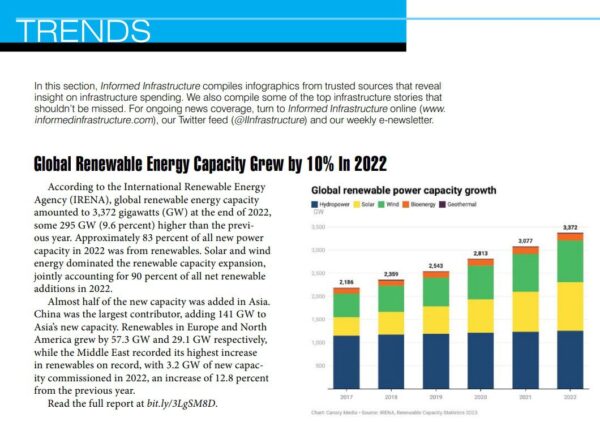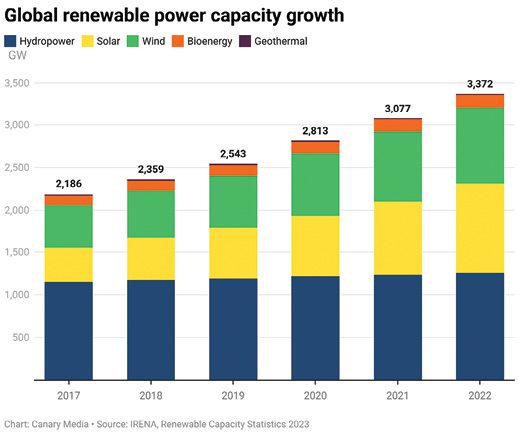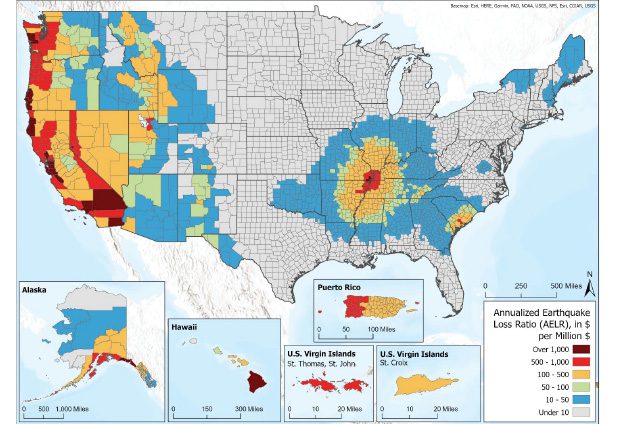Trends May 2023

In this section, Informed Infrastructure compiles infographics from trusted sources that reveal insight on infrastructure spending. We also compile some of the top infrastructure stories that shouldn’t be missed. For ongoing news coverage, turn to Informed Infrastructure online (www.informedinfrastructure.com), our Twitter feed (@IInfrastructure) and our weekly e-newsletter.
Global Renewable Energy Capacity Grew by 10% In 2022

According to the International Renewable Energy Agency (IRENA), global renewable energy capacity amounted to 3,372 gigawatts (GW) at the end of 2022, some 295 GW (9.6 percent) higher than the previous year. Approximately 83 percent of all new power capacity in 2022 was from renewables. Solar and wind energy dominated the renewable capacity expansion, jointly accounting for 90 percent of all net renewable additions in 2022.
Almost half of the new capacity was added in Asia. China was the largest contributor, adding 141 GW to Asia’s new capacity. Renewables in Europe and North America grew by 57.3 GW and 29.1 GW respectively, while the Middle East recorded its highest increase in renewables on record, with 3.2 GW of new capacity commissioned in 2022, an increase of 12.8 percent from the previous year.
Read the full report at bit.ly/3LgSM8D.
The resilience of roads and highways is critical for protecting lives and property, reducing economic losses and maintaining mobility in times of crisis. The Resilient Roads Roundtable is a council of transportation infrastructure luminaries and their organizations with a common interest in improving the resiliency and longevity of North American roadways. The group recently released its “Spring 2023 Innovators and Influencers” list, showcasing infrastructure leaders who have been making extraordinary contributions to improve road resilience materials and methods.
The spring 2023 list features seven resilience leaders, ranging from department of transportation officials and academic researchers to transportation engineering firm executives and technology pioneers. Included in the new Resilient Roads Roundtable list is Roger Millar, secretary of the Washington State Department of Transportation and president of the American Association of State Highway and Transportation Officials, who has been a vocal advocate for enhanced road resilience. Also included is Dr. Stephen E. Flynn, professor of Political Science and founding director of the Global Resilience Institute at Northeastern University, whose thought leadership established him as one of the world’s leading experts on critical infrastructure.
To see more details about the “Spring 2023 Resilient Roads Roundtable Innovators and Influencers,” visit the group’s website at ResilientRoadways.com.
FTA Announces More than $14 Billion in Federal Funding to Support Public Transportation
As part of its annual support to transit systems nationwide, the Federal Transit Administration (FTA) published details (at bit.ly/3H77tZs) about the formula funding that helps communities maintain and operate the trains, buses and ferries that provide more than half a million transit trips every month. In 2023, a total of $14 billion is being invested in states and transit agencies to help improve public transportation, meeting local goals such as upgrading stations and tracks, transitioning to next-generation buses, planning and designing new transit corridors, and providing specialized service for seniors and riders with disabilities.
Report Examines Relationship Between Climate and Built Environment
The National Institute of Building Sciences Consultative Council issued its “2022 Moving Forward Report,” which looks closely at the relationship between the climate emergency and the built environment, charting a path toward decarbonization of U.S. buildings.
The report specifically examines opportunities and challenges facing the U.S. building sector and provides recommendations for accelerating reductions in embodied and operational carbon in existing buildings and new construction.
View the full report at bit.ly/3UUzMjv.
 Hazus Estimated Annualized Earthquake Losses for the United States
Hazus Estimated Annualized Earthquake Losses for the United StatesResearch from U.S. Geological Survey and the Federal Emergency Management Agency finds earthquakes cause $14.7 billion in damages on an annualized basis nationwide—twice that of the previous estimate.
.jpg)

TOP Stories
The following are the top stories from the last few months (in terms of traffic) on the Informed Infrastructure website. This also reflects key coverage areas that are regularly refreshed online and via our weekly e-newsletter.
Simply search key words on Informed Infrastructure online to find the full story.
Buildings
- AISC Releases Buy Clean Guidance to Help Legislators Maximize Structural Steel’s Unmatched Sustainability
- Video: How to Build a Wood Skyscraper
- Bruynzeel: 90% CO2 Savings Possible on Buildings
- American Concrete Institute Publishes Code Requirements for Glass Fiber-Reinforced Polymer (GFRP) Bars
- PCA Introduces Updated RCC Design Manual
Transportation
- Novel Road Surfaces Could Be Key To Living With Climate Change
- California High-Speed Rail Authority Selects Atlas and Its JV Partners for $400 Million Program Management Contract
- Norwegian Public Roads Administration Selects Trimble for Asset Lifecycle Management
- Road to Resiliency: Episode 1 – Bad Things Were About to Happen
- USDOT Announces Two New Actions to Advance Economic Opportunity for Disadvantaged Workers and Businesses through the Bipartisan Infrastructure Law
Water
- Brown and Caldwell to Design the Replacement of Critical Southern California Water Pipeline
- 120Water Platform Selected to Manage Indiana Lead Service Line Database
- Elevate Your Standards in 2023 With Standard Methods for the Examination of Water and Wastewater, 24th Edition
- Cleaning Contaminated Water With Flax Shives
- Awwa Releases Insights Report From Water 2050 Technology Think Tank
Tools and Technology
- Vectorworks, Inc. Announces New Cloud and Mobile Enhancements Built on Apple Technology
- Navigate New Waters with UltraMap 6.0
- HDR Creates Industry-First Customizable Multimodal Tool for Analyzing Airport Landside Traffic
- ALLPLAN and Solibri Facilitate Higher Quality Models for Optimum Buildability
- Vodafone Creates Country-Scale Digital Twins to Engineer Better Networks


